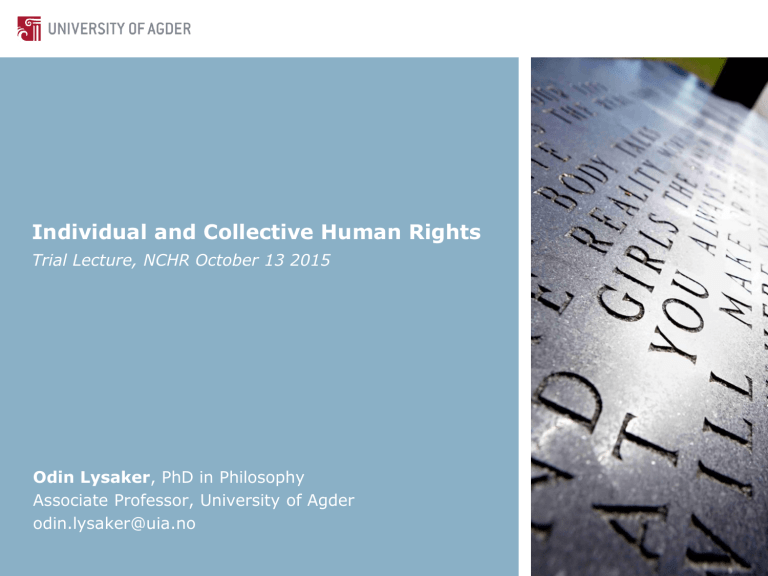
Individual and Collective Human Rights Trial Lecture, NCHR October 13 2015 Odin Lysaker, PhD in Philosophy Associate Professor, University of Agder odin.lysaker@uia.no 2 The Assignment • “Individual v. collective human rights: Implications for philosophy and its quest for grounding human rights norms.” • Although this assignment includes two elements, namely a conceptual and a justificatory, I shall focus on the latter, that is, the normative grounding of human rights. • What is at stake regarding whether human rights are justified as either ‘individual’ or ‘collective’? And is the assignment’s assumed tension between these forms of rights adequate? 3 The Trial Lecture’s Frame • NCHR’s Master Programme – “Theory and Practice of Human Rights” • Mandatory course (HUMR 5131), 1. semester – Introduction to the History, Philosophy, and Politics of Human Rights • “philosophical (…) justification of universal human rights” 4 Today’s Plan • Definitions: ‘human rights’; ‘human dignity’; ‘individual human rights’; ‘collective human rights’ • Pros & Cons – ‘individual human rights’ vs. ‘collective human rights’ • More than a ‘family quarrel’? – Non-/complementarity between ‘individual’ and ‘collective’ human rights regards to their normative justification • Q&A 5 What Is a ‘Human Right’? • Human rights = Moral norms: - Individual – apply to human persons - Inalienable – inherently inviolable - Fundamental – basic for human beings - Universal – independent of time and space - Egalitarian – equal treatment of all • Regardless of collective status (e.g., ethnic, sexual, linguistic, or religious) (UDHR, Article 2) 6 The Kantian Background Picture • “recognition of the inherent dignity and of the equal and inalienable rights of all members of the human family” (UDHR, Preamble) • “that which [is] (…) an end in itself has (…) an inner [i.e., inherent] worth, that is, dignity.” (Kant, Groundwork, 1785) • Human rights protection= Morally individual ≠ Collective 7 What Are ‘Individual Human Rights’? • Definition: “bestowed upon every single human being personally” (Yoram Dinstein 1976) • Whose individuality – which rights? - ‘Basic’/’fundamental’ human rights (1 generation, i.e., Civil & Political) (e.g., the right to freedom of religion) ascribed to human ‘individuals’, or persons, regardless of either (a) personhood or (b) collective status - Basic human rights protecting individual members of humanity, that is, membership characteristics (i.e., personhood/personality) (e.g., autonomy) - Economic, Social & Cultural rights (2 generation) (e.g., the right to hold opinions) ascribed to individual group members (e.g., citizen in a state) • Central thinkers: James Griffin; James Nickel; Allen Buchanan, etc. 8 What Are ‘Collective Human Rights’? • Definition: “afforded to human beings communally” (Yoram Dinstein 1976) • Whose collective – which rights? - Human (‘group’) rights’ ascribed to a ‘collective’ as valuable in it self (e.g., group; minority; people) - Economic, Social & Cultural rights (2 generation) protecting individual members of a ‘collective’ (e.g., minority member) - All human rights (both 1 & 2 generation) that are exercised collectively (e.g., the right to free speech practiced in democratic publics) - Basic human rights (1 generation, i.e., Civil & Political) ascribed to members of humanity as a ‘collectivity’, that is, “all members of the human family” (Preamble, UDHR) • Central thinkers: Iris Marion Young; Charles Taylor; Will Kymlicka, etc 9 Pros & Cons – Individual Human Rights Pros Cons • Since human rights normatively are grounded in inherent dignity (cf. Preamble), and only persons are ascribed such moral status, these rights are ‘individual’ • Human rights based on individuals’ ‘human’ dignity is too abstract to grasp systematic human rights violations of groups • Example: In the Canadian context, disabled persons, as ‘humans’, have a basic ‘human right to democracy’ (UDHR, Article 21), which ensures them equal participation in polls • Example: CBS News reports that the right to democracy is violated to members of the minority group of disabled in Canadian polls 10 Pros & Cons – Collective Human Rights Pros • • As groups cannot be reduced to its members, human rights should be collectively justified Example: The minority group of disabled persons must appeal to the collective rights in CRPD to have an actual voice in Canadian polls Cons • If even ‘individual’ human rights can be exercised ‘collectively’, the term ‘collective human rights’ is inadequate • Example: As long as each member of the minority group of disabled is recognized by the Canadian society as co-citizen, their (2 generation) civil and political rights will be fulfilled 11 The Nussbaumian Story on Human Rights • Martha Nussbaum combines aspects of both the individual and collective account • The individual view: - “[H]uman rights (…) uphold[-] the (…) [human] dignity of all persons”, i.e., the ‘basic principle’ - ‘Embodied dignity’: Human dignity is grounded in persons’ bodily ‘situatedness’ (i.e., collectivity) - ‘Relational autonomy’: Self-determination depends on social relationships (i.e., collectivities) • The collective approach: - ‘Asymmetrical dependency’: Due to ‘shared human features’, such as bodily vulnerability, individuals are mutually dependent on others (i.e., collectivities) - ‘General disability’: All humans are more or less, for longer or shorter period, disabled Wrap Up • In spite of the crucial role of the tension between ‘individual’ and ‘collective’ rights in the contemporary international discourse on the philosophy of human rights (e.g., the minority group of disabled) – and since my assignment is on the grounding of human rights – I hold that Nussbaum, particularly her account of dignity, represents a ‘golden mean’ between these camps • Still, the assignment for my trial lecture is not a matter of normative justification alone, but also for future conceptual and empirical inquires within the interdisciplinary research field of human rights – in addition to an awareness regarding both individual and collective struggles for human rights protection on a national as well as a global level • Q&A 13



